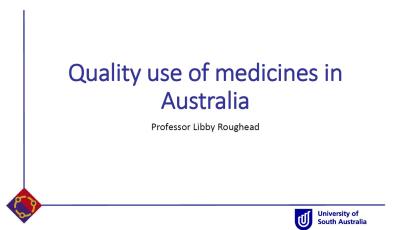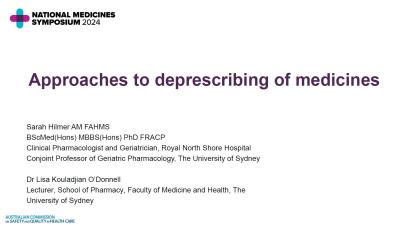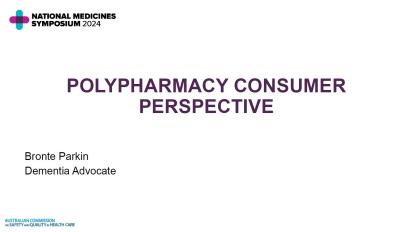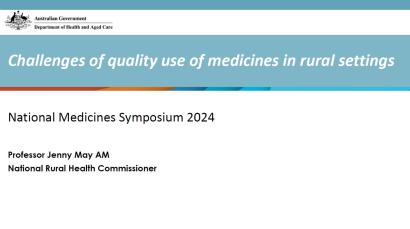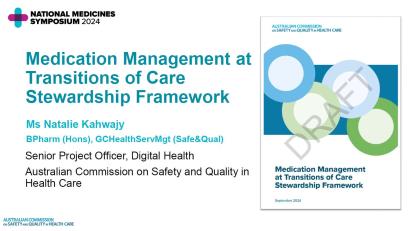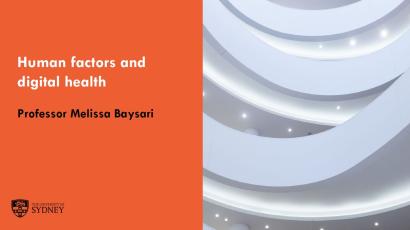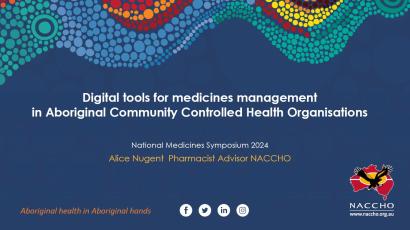NMS 2024
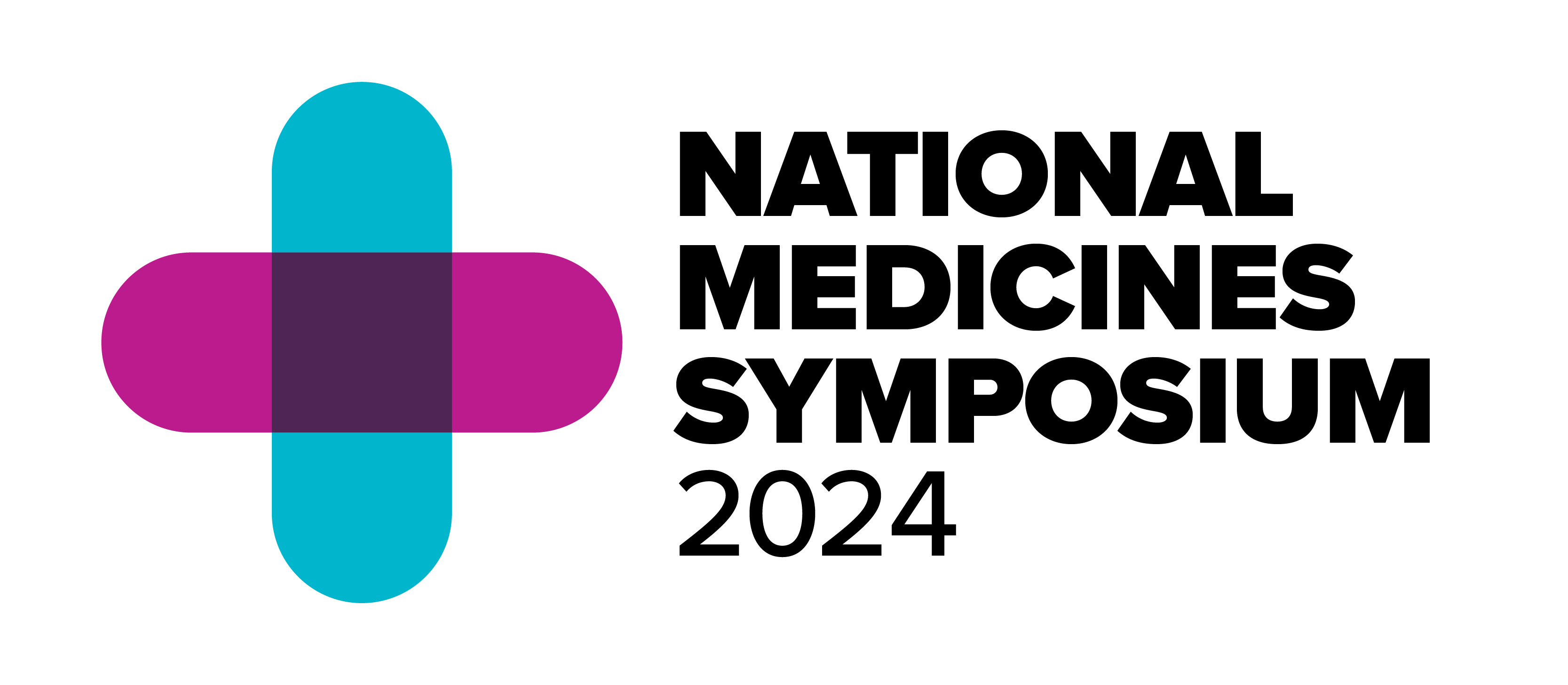
National Medicines Symposium 2024
The National Medicines Symposium 2024, was held on the 19 November and explored the safe and appropriate use of medications in an ageing population.
Overview
Appropriate Use of Medicines in an Ageing Population
Safe and appropriate use of medicines in an ageing population is a complex balance between managing disease and avoiding medication-related problems. As the population ages, more Australians are living with multiple chronic diseases and may take multiple medicines, which is known as polypharmacy.
Polypharmacy increases the risk of medicine-related problems. Optimal medication management in older people requires a multi-disciplinary approach to ensure the best quality of life.
On 19 November 2024, the National Medicines Symposium brought together leading experts, clinicians, consumers and policymakers for a timely discussion on emerging and key issues for medication safety in an ageing population. The Symposium focused on highlighting tools and approaches to improve the safe and quality use of medicines.
Session recordings
Session 1
Session 1 |
|---|
Challenges of medicine safety in an ageing population
Medicine use and prescribing practices in older Australians are often complex and challenging.
This session set the scene for the appropriate use of medicines and medicine safety in an ageing population. It focused on the importance of person-centred prescribing as part of appropriate care for an ageing population. It highlighted the complexities and challenges facing the safe and quality use of medicines for an ageing population including multimorbidity, polypharmacy, prescribing high-risk medicines and the goals of care as people age. It emphasised the importance of deprescribing and the models for medicines management and review in older Australians.
Keynote Speakers |
|---|
Welcome to Country
Ms Yvonne Weldon AM, Metropolitan Local Aboriginal Land Council
- YouTube Timestamp 00:00
Introduction with NMS 2024 Facilitator
Ms Tegan Taylor, Health and Science Journalist
- YouTube Timestamp 04:46
Opening remarks
The Honourable Mark Butler MP, Minister for Health and Aged Care
- YouTube Timestamp 06:06
Welcoming address
Conjoint Professor Anne Duggan, Chief Executive Officer, Australian Commission on Safety and Quality in Health Care
- YouTube Timestamp 09:04
Quality use of medicines in Australia
Professor Libby Roughead, Director of the Quality Use of Medicines and Pharmacy Research Centre, University of South Australia
Professor Libby Roughead, an internationally recognised expert in medicines use, explored the evolving landscape of quality use of medicines in Australia. Reflecting on decades of experience, Professor Roughead highlighted key lessons from the history of quality use of medicines and outlined how healthcare providers can adapt to the challenges of an ageing population in the 21st Century.
- YouTube Timestamp 12:29
Setting the scene: WHO Global Patient Safety Challenge – Medication Without Harm – Australia’s response – 2023 status report
Mr Steve Waller, Senior Advisor, Medication Without Harm, Australian Commission on Safety and Quality in Health Care
How far have we come in addressing the challenge of reducing medication-related harm in Australia? Mr Steve Waller, Senior Advisor for the Commission’s WHO Medication Without Harm initiative shared the latest Australian Status Report, which outlined critical achievements since 2020 and identified priorities for future action. This session provided a comprehensive look at the practical steps being taken to reduce harm by 50% by 2023 and offered insights into the opportunities for healthcare providers, policymakers, and practitioners to contribute to further improvements in medication safety.
- YouTube Timestamp 28:32
Clinician’s perspective on managing medicines for an ageing population
Professor Jennifer Martin, Physician, Clinical Pharmacologist and President of the Royal Australasian College of Physicians
With an ageing population, managing medication has never been more complex or crucial. Professor Jennifer Martin, physician and clinical pharmacologist, provided a clinician's perspective on the risks and challenges of prescribing for older adults. This session explored how multimorbidity and polypharmacy could lead to serious adverse events, hospitalisations, and long-term harm. Professor Martin shared real-world tools and strategies that doctors could use to safely prescribe medicines, adjust doses, and avoid harmful drug interactions, thereby ensuring better health outcomes for older patients.
- YouTube Timestamp 40:40
Panel Discussion – How are the challenges of medication safety for an ageing population being addressed?
-
Professor Libby Roughead
-
Mr Steve Waller
-
Professor Jennifer Martin
The panel discussion explored the challenges of safe medication use for an ageing population. Experts addressed the complexities of polypharmacy, age-related physiological changes, and the specific health needs of older adults. Key topics included enhancing medication safety through partnering with patients, setting individualised goals of care, and best prescribing practices. The panel also reflected on progress in the field and discussed collaborative strategies to improve patient outcomes and the future of geriatric pharmacotherapy.
- YouTube Timestamp 57:41
Session 2
Session 2 |
|---|
Deprescribing
Optimal medication management in older people requires a multifaceted and collaborative approach with a variety of strategies and interventions to support appropriate medicines use.
This session explored practical ways to reduce the risks of medicine use for older Australians. The session featured safe and appropriate approaches to deprescribing of medicines. It highlighted practical guidelines and tools for identifying and safely deprescribing potentially inappropriate medicines. It also focused on the burden of inappropriate polypharmacy from a consumer perspective and highlighted approaches for engaging and empowering patients in decision-making.
Approaches to deprescribing of medicines
-
Professor Sarah Hilmer AM, Head of Department of Clinical Pharmacology and Geriatrician, Royal North Shore Hospital and Conjoint Professor of Geriatric Pharmacology, Northern Clinical School, Faculty of Medicine and Health, The University of Sydney
-
Dr Lisa Kouladjian O’Donnell, Lecturer, School of Pharmacy, Faculty of Medicine and Health, The University of Sydney and Deputy Chair, Australian Deprescribing Network
Deprescribing is an essential process aimed at improving the safety of Australians who take multiple medications. In this session, Professor Sarah Hilmer AM and Dr Lisa Kouladjian O'Donnell, leaders in clinical pharmacology and the Australian Deprescribing Network, explored practical approaches to deprescribing medicines when the risks outweighed the benefits. Attendees learned why deprescribing was crucial for older adults, how clinicians can initiate conversations, and the strategies used to safely reduce medication burden while ensuring patient well-being. Whether they were GPs, pharmacists, or other healthcare professionals, participants left the session equipped with tools to apply deprescribing in their practice.
- YouTube Timestamp 00:00
Polypharmacy Consumer Perspective
Mr Bronte Parkin, Dementia Advocate, Dementia Australia
Mr Bronte Parkin, a passionate Dementia Advocate, shared his personal story of managing polypharmacy from the perspective of a caregiver. After his wife's adverse reaction to psychotropic medicines led to her admission to residential care, Bronte faced the challenge of deprescribing and implementing non-pharmacological interventions. This session offered invaluable insight into the lived experience of navigating medication management in dementia care, and provided practical knowledge of the new standards of care. Healthcare professionals working with patients and families affected by dementia gained a better understanding of how to integrate compassionate care with safe prescribing practices.
- YouTube Timestamp 16:34
Challenges of quality use of medicines in rural settings
Professor Jenny May AM, National Rural Health Commissioner and General Practitioner
Professor May AM provided a brief typology of the services that were available in rural and remote settings and the intersections this has with quality use of medicines and the opportunities for general practice.
- YouTube Timestamp 28:04
Panel Discussion – Medicine-related harm and the importance of safe and appropriate use of medicines
-
Dr Lisa Kouladjian O’Donnell
-
Mr Bronte Parkin
-
Professor Jenny May AM
-
Dr Phoebe Holdenson Kimura
This panel discussion focused on practical strategies and communication skills for engaging patients in meaningful conversations about deprescribing. Experts shared techniques for addressing patient concerns, building trust, and encouraging shared decision-making to support safe and effective medication management.
- YouTube Timestamp 46:03
Session 3
Session 3 |
|---|
Digital tools for medicine safety
Digital health tools and improved digital literacy can empower older Australians and healthcare providers to manage medications more safely and effectively.
This session focused on innovative tools and advancements in digital health data aimed at improving medicine safety in older people. It highlighted how digital health supported medication management and showcased the Commission’s work in this area, including the Medication Management at Transitions of Care Framework.
Medication Management at Transitions of Care Stewardship Framework
Ms Natalie Kahwajy, Senior Project Officer, Digital Health, Australian Commission on Safety and Quality in Health Care
Medication errors and miscommunication during transitions of care are a significant risk to patient safety. In this session, Ms Natalie Kahwajy introduced attendees to the new national Medication Management at Transitions of Care Stewardship Framework, that has been developed by the Commission to address this critical issue. This framework was designed to support healthcare providers in improving medication safety and continuity of care during transitions, such as hospital discharge or moving between care settings. Attendees gained an understanding of how to implement this framework in their organisations to reduce harm and enhance patient outcomes.
- YouTube Timestamp 00:00
Human factors and digital health
Professor Melissa Baysari, Professor of Health Research, The University of Sydney
Professor Melissa Baysari demystified the concept of Human Factors, a scientific approach to designing technology that fits the needs of both users and healthcare organisations. Attendees learned how these insights can enhance the usability of digital health tools, minimised errors, and improved patient safety. With real-world examples from her research, Melissa showed how optimising the human-technology relationship was key to better healthcare outcomes and smoother clinical workflows.
- YouTube Timestamp 09:57
Managing medicines safety using digital tools in rural and remote settings
Mr Michael Baker, Chief Pharmacy Information Officer, SA Pharmacy
How can digital tools bridge the gaps in fragmented healthcare systems and improve medication safety? In this session, Mr Michael Bakker shared practical insights into the role of digital solutions in ensuring continuity of care across a patient's journey. Attendees discovered how reducing informational gaps led to fewer medication errors, improved patient safety, and contributed to a more efficient healthcare system. Whether attendees were involved in clinical practice or healthcare policy, this session offered actionable strategies for enhancing medicine safety through digital innovation.
- YouTube Timestamp 19:06
Digital tools for medicines management in Aboriginal Community Controlled Health Organisations
Ms Alice Nugent, Pharmacist Advisor, Medicines Policy and Programs, National Aboriginal Community Controlled Health Organisations
This presentation on digital tools for medicines management in Aboriginal Community Controlled Health Organisations shared practical examples of where these tools worked work well; and suggested improvements. The learnings were applicable to all settings where medicines featured in the patient journey, including general practice, specialists, hospitals and pharmacies.
- YouTube Timestamp 28:47
Panel Discussion – Digital tools for the safe and appropriate use of medicines
-
Professor Melissa Baysari
-
Mr Michael Bakker
-
Ms Kate Oliver
This panel discussion focused on digital tools and advances and how these can be used to support safe medication management in ageing Australians. Experts explored innovative digital health tools that facilitated seamless communication and medication management across varied settings, including during transitions of care from hospital to home and the interfaces with aged care. Additionally, the conversation addressed the importance of enhancing workforce and consumer digital literacy, highlighting tools and resources that empowered both healthcare professionals and patients to navigate digital platforms effectively. By fostering a collaborative dialogue, the panel identified digital solutions that enhance medication safety and improved overall patient health outcomes.
- YouTube Timestamp 39:11
Closing Address
Professor Christine Kilpatrick AO, Chair of the Board of the Australian Commission on Safety and Quality in Health Care
- YouTube Timestamp 1:10:31
Close with NMS 2024 Facilitator
Ms Tegan Taylor, Health and Science Journalist
- YouTube Timestamp 1:12:25
Lightning Talks
Lightning Talks |
|---|
The Lightning Talks for NMS24 were an enlightening series of talks that delved into the pivotal role of pharmacists in improving medication safety and patient care in aged care settings.
Presentations |
|
|---|---|
| Medicine safety for older Australians: Pharmacists in aged care | A/Professor Fei Sim, National President, Pharmaceutical Society of Australia and a Associate Professor in the Curtin Medical School at Curtin University and a practising pharmacist. |
| Use of Clinical Risk Assessment Tools: A multidisciplinary approach | Ms Gauri Godbole, Specialist Pharmacist, Aged and Palliative care, Gosford Hospital and Chair, Specialty Practice Leadership Committee in Geriatric Medicine, Advanced Pharmacy Australia. |
Session 1
Session 1 |
|---|
Challenges of medicine safety in an ageing population
Medicine use and prescribing practices in older Australians are often complex and challenging.
This session set the scene for the appropriate use of medicines and medicine safety in an ageing population. It focused on the importance of person-centred prescribing as part of appropriate care for an ageing population. It highlighted the complexities and challenges facing the safe and quality use of medicines for an ageing population including multimorbidity, polypharmacy, prescribing high-risk medicines and the goals of care as people age. It emphasised the importance of deprescribing and the models for medicines management and review in older Australians.
Keynote Speakers |
|---|
Welcome to Country
Ms Yvonne Weldon AM, Metropolitan Local Aboriginal Land Council
- YouTube Timestamp 00:00
Introduction with NMS 2024 Facilitator
Ms Tegan Taylor, Health and Science Journalist
- YouTube Timestamp 04:46
Opening remarks
The Honourable Mark Butler MP, Minister for Health and Aged Care
- YouTube Timestamp 06:06
Welcoming address
Conjoint Professor Anne Duggan, Chief Executive Officer, Australian Commission on Safety and Quality in Health Care
- YouTube Timestamp 09:04
Quality use of medicines in Australia
Professor Libby Roughead, Director of the Quality Use of Medicines and Pharmacy Research Centre, University of South Australia
Professor Libby Roughead, an internationally recognised expert in medicines use, explored the evolving landscape of quality use of medicines in Australia. Reflecting on decades of experience, Professor Roughead highlighted key lessons from the history of quality use of medicines and outlined how healthcare providers can adapt to the challenges of an ageing population in the 21st Century.
- YouTube Timestamp 12:29
Setting the scene: WHO Global Patient Safety Challenge – Medication Without Harm – Australia’s response – 2023 status report
Mr Steve Waller, Senior Advisor, Medication Without Harm, Australian Commission on Safety and Quality in Health Care
How far have we come in addressing the challenge of reducing medication-related harm in Australia? Mr Steve Waller, Senior Advisor for the Commission’s WHO Medication Without Harm initiative shared the latest Australian Status Report, which outlined critical achievements since 2020 and identified priorities for future action. This session provided a comprehensive look at the practical steps being taken to reduce harm by 50% by 2023 and offered insights into the opportunities for healthcare providers, policymakers, and practitioners to contribute to further improvements in medication safety.
- YouTube Timestamp 28:32
Clinician’s perspective on managing medicines for an ageing population
Professor Jennifer Martin, Physician, Clinical Pharmacologist and President of the Royal Australasian College of Physicians
With an ageing population, managing medication has never been more complex or crucial. Professor Jennifer Martin, physician and clinical pharmacologist, provided a clinician's perspective on the risks and challenges of prescribing for older adults. This session explored how multimorbidity and polypharmacy could lead to serious adverse events, hospitalisations, and long-term harm. Professor Martin shared real-world tools and strategies that doctors could use to safely prescribe medicines, adjust doses, and avoid harmful drug interactions, thereby ensuring better health outcomes for older patients.
- YouTube Timestamp 40:40
Panel Discussion – How are the challenges of medication safety for an ageing population being addressed?
-
Professor Libby Roughead
-
Mr Steve Waller
-
Professor Jennifer Martin
The panel discussion explored the challenges of safe medication use for an ageing population. Experts addressed the complexities of polypharmacy, age-related physiological changes, and the specific health needs of older adults. Key topics included enhancing medication safety through partnering with patients, setting individualised goals of care, and best prescribing practices. The panel also reflected on progress in the field and discussed collaborative strategies to improve patient outcomes and the future of geriatric pharmacotherapy.
- YouTube Timestamp 57:41
Session 2
Session 2 |
|---|
Deprescribing
Optimal medication management in older people requires a multifaceted and collaborative approach with a variety of strategies and interventions to support appropriate medicines use.
This session explored practical ways to reduce the risks of medicine use for older Australians. The session featured safe and appropriate approaches to deprescribing of medicines. It highlighted practical guidelines and tools for identifying and safely deprescribing potentially inappropriate medicines. It also focused on the burden of inappropriate polypharmacy from a consumer perspective and highlighted approaches for engaging and empowering patients in decision-making.
Approaches to deprescribing of medicines
-
Professor Sarah Hilmer AM, Head of Department of Clinical Pharmacology and Geriatrician, Royal North Shore Hospital and Conjoint Professor of Geriatric Pharmacology, Northern Clinical School, Faculty of Medicine and Health, The University of Sydney
-
Dr Lisa Kouladjian O’Donnell, Lecturer, School of Pharmacy, Faculty of Medicine and Health, The University of Sydney and Deputy Chair, Australian Deprescribing Network
Deprescribing is an essential process aimed at improving the safety of Australians who take multiple medications. In this session, Professor Sarah Hilmer AM and Dr Lisa Kouladjian O'Donnell, leaders in clinical pharmacology and the Australian Deprescribing Network, explored practical approaches to deprescribing medicines when the risks outweighed the benefits. Attendees learned why deprescribing was crucial for older adults, how clinicians can initiate conversations, and the strategies used to safely reduce medication burden while ensuring patient well-being. Whether they were GPs, pharmacists, or other healthcare professionals, participants left the session equipped with tools to apply deprescribing in their practice.
- YouTube Timestamp 00:00
Polypharmacy Consumer Perspective
Mr Bronte Parkin, Dementia Advocate, Dementia Australia
Mr Bronte Parkin, a passionate Dementia Advocate, shared his personal story of managing polypharmacy from the perspective of a caregiver. After his wife's adverse reaction to psychotropic medicines led to her admission to residential care, Bronte faced the challenge of deprescribing and implementing non-pharmacological interventions. This session offered invaluable insight into the lived experience of navigating medication management in dementia care, and provided practical knowledge of the new standards of care. Healthcare professionals working with patients and families affected by dementia gained a better understanding of how to integrate compassionate care with safe prescribing practices.
- YouTube Timestamp 16:34
Challenges of quality use of medicines in rural settings
Professor Jenny May AM, National Rural Health Commissioner and General Practitioner
Professor May AM provided a brief typology of the services that were available in rural and remote settings and the intersections this has with quality use of medicines and the opportunities for general practice.
- YouTube Timestamp 28:04
Panel Discussion – Medicine-related harm and the importance of safe and appropriate use of medicines
-
Dr Lisa Kouladjian O’Donnell
-
Mr Bronte Parkin
-
Professor Jenny May AM
-
Dr Phoebe Holdenson Kimura
This panel discussion focused on practical strategies and communication skills for engaging patients in meaningful conversations about deprescribing. Experts shared techniques for addressing patient concerns, building trust, and encouraging shared decision-making to support safe and effective medication management.
- YouTube Timestamp 46:03
Session 3
Session 3 |
|---|
Digital tools for medicine safety
Digital health tools and improved digital literacy can empower older Australians and healthcare providers to manage medications more safely and effectively.
This session focused on innovative tools and advancements in digital health data aimed at improving medicine safety in older people. It highlighted how digital health supported medication management and showcased the Commission’s work in this area, including the Medication Management at Transitions of Care Framework.
Medication Management at Transitions of Care Stewardship Framework
Ms Natalie Kahwajy, Senior Project Officer, Digital Health, Australian Commission on Safety and Quality in Health Care
Medication errors and miscommunication during transitions of care are a significant risk to patient safety. In this session, Ms Natalie Kahwajy introduced attendees to the new national Medication Management at Transitions of Care Stewardship Framework, that has been developed by the Commission to address this critical issue. This framework was designed to support healthcare providers in improving medication safety and continuity of care during transitions, such as hospital discharge or moving between care settings. Attendees gained an understanding of how to implement this framework in their organisations to reduce harm and enhance patient outcomes.
- YouTube Timestamp 00:00
Human factors and digital health
Professor Melissa Baysari, Professor of Health Research, The University of Sydney
Professor Melissa Baysari demystified the concept of Human Factors, a scientific approach to designing technology that fits the needs of both users and healthcare organisations. Attendees learned how these insights can enhance the usability of digital health tools, minimised errors, and improved patient safety. With real-world examples from her research, Melissa showed how optimising the human-technology relationship was key to better healthcare outcomes and smoother clinical workflows.
- YouTube Timestamp 09:57
Managing medicines safety using digital tools in rural and remote settings
Mr Michael Baker, Chief Pharmacy Information Officer, SA Pharmacy
How can digital tools bridge the gaps in fragmented healthcare systems and improve medication safety? In this session, Mr Michael Bakker shared practical insights into the role of digital solutions in ensuring continuity of care across a patient's journey. Attendees discovered how reducing informational gaps led to fewer medication errors, improved patient safety, and contributed to a more efficient healthcare system. Whether attendees were involved in clinical practice or healthcare policy, this session offered actionable strategies for enhancing medicine safety through digital innovation.
- YouTube Timestamp 19:06
Digital tools for medicines management in Aboriginal Community Controlled Health Organisations
Ms Alice Nugent, Pharmacist Advisor, Medicines Policy and Programs, National Aboriginal Community Controlled Health Organisations
This presentation on digital tools for medicines management in Aboriginal Community Controlled Health Organisations shared practical examples of where these tools worked work well; and suggested improvements. The learnings were applicable to all settings where medicines featured in the patient journey, including general practice, specialists, hospitals and pharmacies.
- YouTube Timestamp 28:47
Panel Discussion – Digital tools for the safe and appropriate use of medicines
-
Professor Melissa Baysari
-
Mr Michael Bakker
-
Ms Kate Oliver
This panel discussion focused on digital tools and advances and how these can be used to support safe medication management in ageing Australians. Experts explored innovative digital health tools that facilitated seamless communication and medication management across varied settings, including during transitions of care from hospital to home and the interfaces with aged care. Additionally, the conversation addressed the importance of enhancing workforce and consumer digital literacy, highlighting tools and resources that empowered both healthcare professionals and patients to navigate digital platforms effectively. By fostering a collaborative dialogue, the panel identified digital solutions that enhance medication safety and improved overall patient health outcomes.
- YouTube Timestamp 39:11
Closing Address
Professor Christine Kilpatrick AO, Chair of the Board of the Australian Commission on Safety and Quality in Health Care
- YouTube Timestamp 1:10:31
Close with NMS 2024 Facilitator
Ms Tegan Taylor, Health and Science Journalist
- YouTube Timestamp 1:12:25
Lightning Talks
Lightning Talks |
|---|
The Lightning Talks for NMS24 were an enlightening series of talks that delved into the pivotal role of pharmacists in improving medication safety and patient care in aged care settings.
Presentations |
|
|---|---|
| Medicine safety for older Australians: Pharmacists in aged care | A/Professor Fei Sim, National President, Pharmaceutical Society of Australia and a Associate Professor in the Curtin Medical School at Curtin University and a practising pharmacist. |
| Use of Clinical Risk Assessment Tools: A multidisciplinary approach | Ms Gauri Godbole, Specialist Pharmacist, Aged and Palliative care, Gosford Hospital and Chair, Specialty Practice Leadership Committee in Geriatric Medicine, Advanced Pharmacy Australia. |
More information
Contact NMS@safetyandquality.gov.au

